- Home
- Aimee Friedman
Two Summers
Two Summers Read online
For my family—the best in any universe
In infinite space, even the most unlikely events must take place somewhere.… People with the same appearance, name and memories as you, who play out every possible permutation of your life choices.
Max Tegmark
I dwell in Possibility—
Emily Dickinson
Contents
Half Title
Title Page
Dedication
Epigraphs
Prologue
Part One: Cobblestones and Croissants
Monday, July 3, 9:43 p.m.
Tuesday, July 4, 11:32 a.m.
Tuesday, July 4, 9:01 p.m.
Part Two: Broken Homes
Monday, July 3, 9:43 p.m.
Tuesday, July 4, 2:22 p.m.
Monday, July 10, 8:48 a.m.
Part Three: A Field of Poppies
Wednesday, July 12, 10:49 a.m.
Friday, July 14, 10:56 a.m.
Part Four: Don’t Tell
Friday, July 14, 9:13 a.m.
Sunday, July 16, 3:03 p.m.
Part Five: Daughter
Tuesday, July 18, 2:04 p.m.
Part Six: Double Lives
Wednesday, July 19, 7:59 a.m.
Part Seven: Double Lives
Wednesday, July 19, 7:17 a.m.
Epilogue
Acknowledgments
About the Author
By Aimee Friedman
Copyright
Monday, July 3, 7:37 p.m.
One, one thousand. Two, one thousand …
I stare down at the clock on my phone, silently counting the seconds until 7:37 p.m. becomes 7:38 p.m. My heartbeat seems to tick in equal rhythm.
Ten, one thousand. Eleven, one thousand …
“Summer, stop it,” orders my best friend, Ruby Singh. I look over at her. Even though her dark-brown eyes are on the road, she can guess what I’m doing. “Obsessing over the time won’t get us there any faster,” she tells me.
“I know that,” I protest, my cheeks hot. I shift in the passenger seat and transfer my phone from one clammy palm to the other.
Twenty-two, one thousand. Twenty-three, one thousand …
The thing is, I wish I could control time: slow it down, speed it up, bend it to my will. To me, minutes and hours are slippery, fickle things. For most of sophomore year (which ended just last week), I showed up to school late and breathless. But on those rare occasions I was invited to some Saturday-night party, I arrived dorkily early. I can’t win.
On this sticky gray summer evening, I am losing the battle again. I chance another glance up from my phone—thirty-five, one thousand; thirty-six, one thousand—at the highway ahead, still clogged with traffic. Red taillights glow like fireflies.
“I’m going to miss my flight,” I mutter, dread rising in my stomach.
I have no one to blame but myself. I was the one who repacked my suitcase twice, waffling over every item of clothing. And I was the one who got into a huge fight with my mother right before we left the house, which was why I had to call Ruby in tears and ask her to drive me to the airport …
“You won’t,” Ruby tells me firmly, changing lanes. Her stacks of woven bracelets slide up and down her wrists as she spins the steering wheel. “Not if I have anything to do with it. And seriously, put your phone away. Isn’t your battery about to die?”
“It is,” I concede with a sigh. I fiddle with my own woven bracelets—I always wear the two that Ruby made for me—and peek back down at my phone.
Fifty-eight, one thousand; fifty-nine, one thousand—
Before I can watch the minute switch over, I drop my phone into the bulging Whitney Museum tote bag at my feet. I shouldn’t have even brought my cell along; I won’t get service overseas. But I’m already missing it like a phantom limb. I wonder if Mom will text me to apologize—or is she waiting for me to text first?—and then I push the thought away.
The car lurches forward a fraction. I sneak a sad peek at Ruby’s broken dashboard clock, which blinks an eternal, useless 12:00. To distract myself, I lean over and riffle through the rest of my tote bag, making sure I have all my essentials:
Chewing gum and magazines for the plane. The thick, shiny guidebook. A printout of the email from Dad with his address and phone numbers listed on it. My fancy new camera. My passport.
I pull out the navy-blue booklet, feeling a pang of excitement as I flip through its fresh, unstamped pages; I’ve never left the country before. When I reach the photo of myself, I frown. My dirty-blond hair falls in messy waves, my smile is crooked, and one gray-blue eye is just slightly larger than the other. At age seven, I saw my first Picasso painting—a woman with upside-down features—and I’d felt a sort of kinship. Ruby told me I was crazy when I’d shared that notion with her.
“Crazy!” Ruby says now, in mock disbelief. “I was actually right again?”
Blinking, I look up to see that we are moving swiftly. The exit sign out the window promises AIRPORT. Warm relief courses through me, and I squeal. I hardly ever squeal, but this occasion calls for it.
“You are never not right,” I tell Ruby. My best friend shoots me a grin. As she heads onto the off-ramp, thunder booms overhead. We both jump a little.
A storm shouldn’t be a surprise; all day, the air’s been thick and humid—mosquito weather. I love summer, and not just because I was named for it. I love the feel of fresh-cut grass tickling my bare soles. Light cotton dresses. Freezer-burned Popsicles. The smoky scent of barbecue as darkness falls. There’s this magical sense of possibility that stretches like a bridge between June and August. A sense that anything can happen.
So far, this summer has promised even more magic—even more possible—than usual. But now, as swollen clouds amass above us, I feel a tremor of apprehension.
“What if it’s a bad omen?” I ask Ruby, nervously twisting my hair up into a sloppy topknot.
The first runways come into view, and Ruby presses her platform sandal against the gas pedal. “You and your omens,” she scoffs.
Another crackle of thunder makes me shudder. I know it’s silly, my belief in signs and harbingers. But superstition can be helpful for indecisive people; it lets us off the hook. Takes the choice out of our hands.
Ruby pulls up to the bustling Delta terminal, and I don’t feel the burst of anticipation I was expecting. I unbuckle my seat belt with uncertain fingers. Raindrops begin to hit the windshield.
“What if … ” I start, my throat suddenly dry, my mind suddenly full of doubts.
“Those are your two favorite words,” Ruby teases, lifting her now-watery iced latte from the cup holder. When I’d called her earlier, she’d been in the middle of her shift at the coffee shop. She’d had to invent some excuse for the manager so she could leave, but first she’d whipped up drinks for both of us. I’d sucked down my iced mocha between sniffles as we’d driven away from my house.
“What if,” I continue, my stomach clenching, “the stuff my mom said is true?” I think back to how my mother and I faced off in the kitchen—the sharpness of Mom’s words, her forehead etched with anger and worry. I squirm in my seat, listening to the roar of airplanes ascending and descending nearby. “Maybe this is a mistake … ”
“Okay. No.” Ruby shakes her head, her silky black hair swiping her tan shoulders. “This isn’t a mistake. It’s your destiny.” Ruby widens her heavily lined eyes, giving me a look of such urgency that it almost feels like she’s pushing me out of the car. “Don’t think about your mom. You’re going to have the best summer ever, Summer Everett.” She giggles at this wordplay, and I can’t help but smile, too, feeling myself relax. “You will find a gorgeous French boyfriend,” she continues, arching her brows, “and Hugh Tyson will be a dist
ant memory.”
I laugh, a blush warming my neck. Leave it to Ruby to bring up my longtime, hopeless crush now. I think of Hugh—his gray-green eyes and light-brown skin. His probably-will-be-valedictorian level of brilliance. His unawareness of my existence.
“Being in a different country won’t suddenly make me visible to the male population,” I point out.
Ruby sighs. My best friend, with her abundant confidence and curvy figure, doesn’t know the meaning of the word unrequited. She’s already had three semi-boyfriends (it should be noted: three more than I’ve ever had), and she told me last week that she intends to “fall in love for real” this summer. I know better than to set such unrealistic goals for myself.
Still, I feel a tentative twinge of hope. It’s enough to dissolve my Mom worries for the moment. I stuff my passport back into my tote and sling the bag over my shoulder.
“But thank you,” I tell Ruby, meaning it fiercely. I lean over the gearshift and grab her in a big hug, choked up by the familiar smell of her flowery perfume. “Love you times two.”
“Love you times two,” Ruby echoes. We invented that phrase back in first grade, where we first met. I have a couple other good friends, but Ruby’s the closest thing I’ve got to a sister. Suddenly, the thought of embarking on this adventure without her seems daunting. How can I survive on my own?
“Go,” Ruby says, disentangling from me. She nods toward the terminal. “Text me when you—oh, you won’t be able to from there.”
“I’ll call,” I promise. “And email. And check Instagram. An unhealthy amount.”
I hear Ruby laugh as I open the car door and step out into the curbside fray. Cars and taxis idle, their doors hanging open like mouths while people maneuver luggage and shout good-byes. Cold rain batters my legs and toes, and I regret having worn just shorts and flip-flops with my T-shirt and hoodie. I zip up the hoodie, race around to the trunk, and retrieve my suitcase, dragging it behind me to the terminal’s sliding doors.
Then I pause, glancing back. I have the urge to reach for my camera and take a picture of Ruby’s car in the rain. My last view before leaving. But then Ruby drives off, windshield wipers clacking. And even without a clock in front of me, I realize that time is hurtling forward. So I take a big breath, and enter the neon-bright airport.
Go, Ruby had said. My adrenaline surges and I navigate around crowds of travelers, the buzz of foreign languages filling the air. I manage to collect my boarding pass and check my suitcase, and I feel flushed and proud, surprised by my own competence. I’ve only flown alone once before, down to Florida to visit my grandparents one weekend. Every other trip has been with Mom.
Mom. My throat tightens and I trip over someone’s luggage wheels.
Ruby told me not to think about Mom. But as I sprint toward security, Mom is all I can think about. I picture her back in our quiet house, adjusting her tortoiseshell glasses, watching the rain. Does she wish I weren’t flying in such bad weather? Does she wish I hadn’t left on such bad terms? Or that I hadn’t left at all?
I recall how I’d bounded into the kitchen, bags in tow, running late and beaming. Ready. Mom had been leaning against the counter, her eyes down and her face pale. She didn’t even have her shoes on. My belly dropped. I knew Mom didn’t love the idea of this trip—she’d been acting weird about it ever since Dad had invited me. So I should have pretended not to notice this latest weirdness. I should have continued on out the door to our car. But it was like poking a wound; I asked her what was wrong.
“I’m … ” She coughed. “Well, to tell the truth, Summer, I’m not sure you should go.” I could feel the blood in my veins turn cold. “I’m not sure you’re fully—prepared.” Another cough. “I’m worried you’ll be … let down. You know how he is.”
My insides switched from icy to boiling hot. He was my dad: Mom’s mortal enemy. Her annoyance at him annoyed me. Yes, they had divorced when I was eleven—a clean split, like a butcher cleaving meat. Dad had gone off to Europe while Mom and I stayed in our humdrum hometown of Hudsonville, New York. And yes, Dad had been a ghostlike presence since then, only sending the occasional email or making the rare Skype call. Once, he’d returned to Hudsonville to take me out for a quick, breezy lunch (“How’s school? You’re so big. I’ve got to run, sweetheart.”) before flitting off again.
But I don’t hold my father’s flakiness against him; he’s an artist after all. A famous artist. Not famous enough that he’d be recognized by the TSA agent currently waving me through the metal detector. But famous enough that his big, bright, beautiful paintings hang in museums and galleries. And famous enough to sometimes get mentioned in articles. I remember the pride I’d felt last year seeing his name, Ned Everett, in the New York Times Arts section, next to a photograph of him, handsome in his paint-spattered clothes.
Actually, the painting that made Dad artist-famous was a portrait he did of me when I was eleven: a fair-haired, big-eyed little girl standing in a field of poppies that he dreamed up. I’ve never seen that painting in person; it’s displayed in a gallery in the South of France.
Which, as it happens, is where I’m headed this summer.
Excitement makes my heart cartwheel as I hurry away from security. I am going to France! Going not just to see “my painting,” as I like to think of it, but to finally see and spend some real time with Dad. Jogging toward my gate, my tote bag bumping my hip, I remember the life-changing email he’d sent me back in April.
Sweetheart, it read, I cannot believe you are turning sixteen this summer (where does the time go?). Come celebrate with me! As you know, I live most of the year in Paris, but I summer down in the South of France, in a beautiful region the French call Provence. I have a big vacation home on a cobblestone street, with artist friends always spilling in and out. You and I can eat croissants and catch up in the sunshine. What do you say?
I’d stared at the screen, giddy and incredulous. But for once in my life, I hadn’t felt hesitant. There’d been no second-guessing. I’d looked around my bedroom, at the stifling sameness of the posters and books, and out the window at the row of identical, squat ranch houses across the street. I could escape. I could experience summer—my season—in a place of cobblestones and croissants. My certainty dizzied me.
Mom, naturally, had been harder to convince. She’d flat-out said no at first, looking almost frightened by the prospect (I’d promptly burst into tears—I’m not a big crier, except, apparently, when it comes to this trip). Then came muffled phone calls between my parents—the first time, to my knowledge, they’d spoken in years—and I’d overheard Mom saying that I wasn’t ready, which stung me. Other kids in school had already done teen tours across Europe and South America. Ruby had been to India with her family twice. Sure, I was shy, and sheltered by my placid suburban existence. But Mom couldn’t keep me in a bubble forever, could she?
After a week of more whispered phone calls, and much nail biting on my part, Mom agreed to let me go—but only because Dad had agreed that I could work as his quasi-assistant. “If you don’t have some sort of job there,” Mom had explained, her tone ominous, “you’ll be loafing around with too much time on your hands.”
It was true that I’d worked every summer since I was thirteen, bandaging knees at the YMCA day camp, serving popcorn at the mall multiplex, and, last year, shelving paperbacks at the local bookstore, Between the Lines. Now I’d be organizing the sketches in Dad’s studio and ordering new paintbrushes for him online. Which all sounded doable to me. As long as I wouldn’t have to be artistic myself: I can’t so much as draw a stick figure.
I reach my gate, sweaty and winded. My flight—Delta 022 nonstop to Marseille Provence Airport—is boarding all rows. Catching my breath, I glance out the long windows that face the runway. There is the plane, white and sleek and dotted with raindrops. Relief and exhilaration fizz up in me. I made it!
I join the snaking line, standing behind a mother and her little girl, who are conversing in French. I take
Spanish in school (Mom’s idea), but since April, I’ve been Googling French vocabulary online. The mother is saying something about the rain—la pluie—and the daughter is giggling. I swallow hard.
I’m an only child, so my mom and I are close in that way twosomes tend to be. Many evenings, we’ll curl up on the couch with Netflix or sit out on our porch with a pint of ice cream, studying the stars. Mom likes to tell me about the theories she’s teaching her philosophy students at Hudsonville College. Once, she told me that some philosophers and scientists believe that there has to be other life on other planets—there are so many galaxies that it seems inevitable. I’d had the thought that maybe, since there were no boys who liked me here on Earth, there was still hope that one from another galaxy, someday, would. Basically I was wishing for an alien boyfriend. Awesome.
My favorite of Mom’s theories, though, is the one about parallel universes—the idea that somewhere out there, in space or time, endless versions of ourselves exist. And each version lives out every possible outcome of our different decisions. Kind of like a cosmic Choose Your Own Adventure. That idea haunts me: sends shivers down my spine and makes the night sky seem vaster.
This summer, I realize, Mom will be alone on the porch with just her theories and our grouchy cat, Ro, for company. True, my aunt—Mom’s twin sister—might stop by to visit, but she’s usually going off to some concert or play at night. So maybe Mom’s reluctance about my trip had less to do with Dad or me, and more to do with the prospect of those lonely evenings.
Regret beats inside me like a second heart. As I step forward in the line, I rummage inside my tote bag for my cell phone. I’m still upset with Mom, but I should text or call her before I get on the plane. The memory of our last exchange, back in the kitchen, makes me cringe.
“You don’t want me to be happy!” I’d shouted. “I am ready! I’m almost sixteen!” I may have stamped a childish foot. “Why do you even hate Dad so much? He’s paying for me to go there. Can’t you cut him some slack?” Hot tears had filled my eyes.
Mom hadn’t comforted me. Her lips white, she’d snapped, “I know that your father has swooped in with this amazing opportunity. But you should be aware—” She’d coughed again. “It might not be what you’re expecting. Not everything is as it seems.”

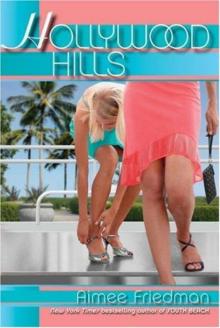 Hollywood Hills
Hollywood Hills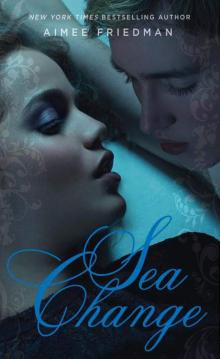 Sea Change
Sea Change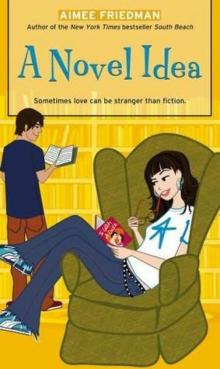 A Novel Idea
A Novel Idea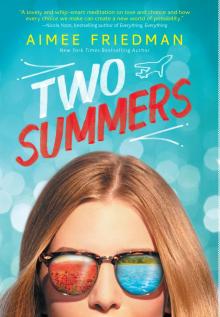 Two Summers
Two Summers French Kiss
French Kiss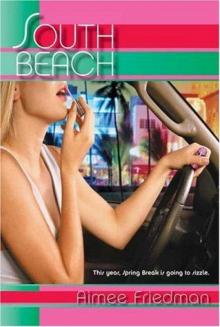 South Beach
South Beach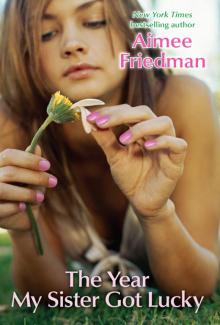 The Year My Sister Got Lucky
The Year My Sister Got Lucky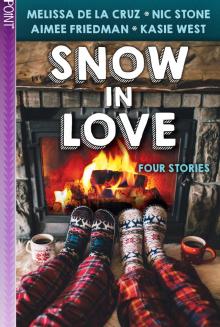 Snow in Love
Snow in Love